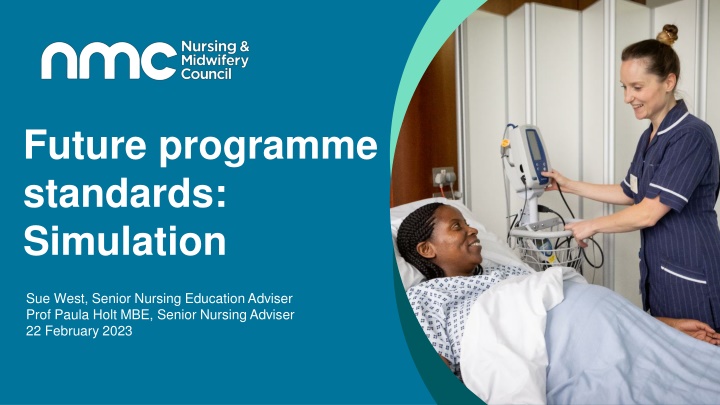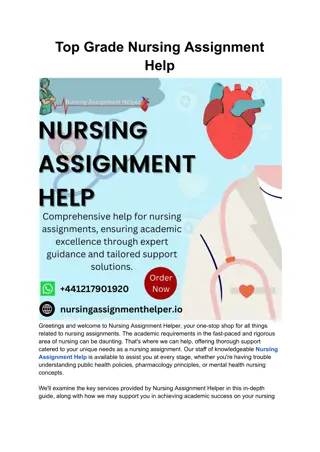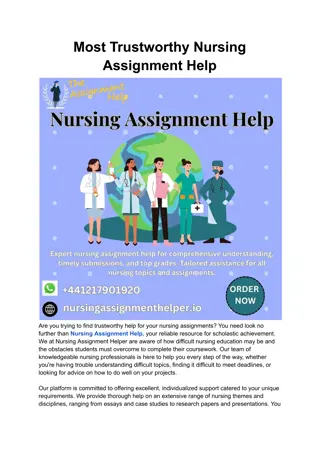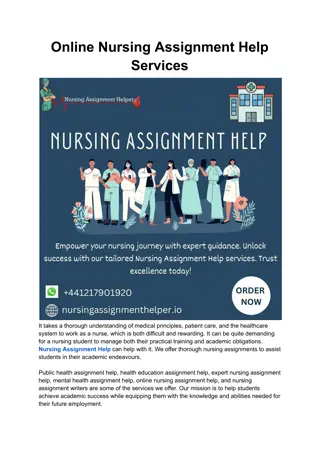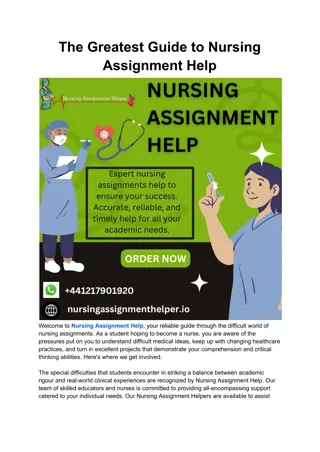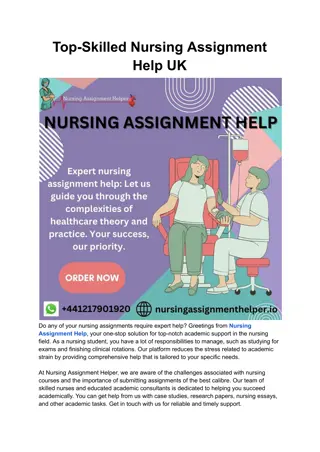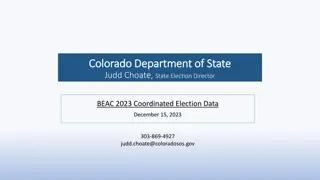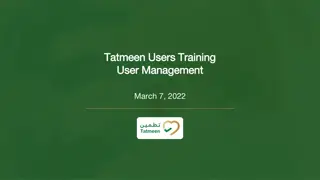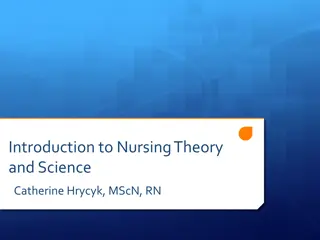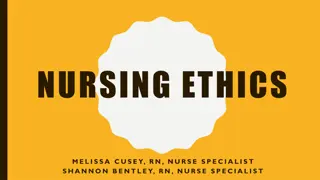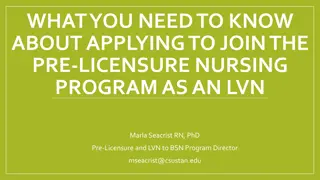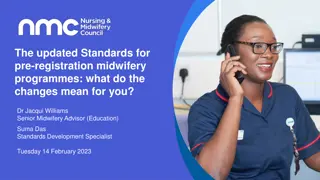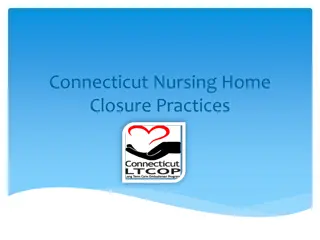Updates to Pre-Registration Nursing Programme Standards
Standards for pre-registration nursing programmes have been revised post-Brexit, with removal of EU Directive references and updates focused on enhancing student safety and inclusivity. Changes were guided by stakeholder feedback, evidence, and consultation findings, approved by the Council under Professor Jean White's leadership.
Download Presentation

Please find below an Image/Link to download the presentation.
The content on the website is provided AS IS for your information and personal use only. It may not be sold, licensed, or shared on other websites without obtaining consent from the author.If you encounter any issues during the download, it is possible that the publisher has removed the file from their server.
You are allowed to download the files provided on this website for personal or commercial use, subject to the condition that they are used lawfully. All files are the property of their respective owners.
The content on the website is provided AS IS for your information and personal use only. It may not be sold, licensed, or shared on other websites without obtaining consent from the author.
E N D
Presentation Transcript
Future programme standards: Simulation Sue West, Senior Nursing Education Adviser Prof Paula Holt MBE, Senior Nursing Adviser 22 February 2023
Housekeeping We will be making written notes of your feedback We will be recording the session and will send the link out by email after the webinar Everyone watching is automatically muted Please use the questions box to share feedback and to present your queries we ll take questions at the end of the presentation We live-caption our online events to make them more accessible. Let us know if you re having technical issues via the questions box or on events@nmc-uk.org 2
Standards for pre-registration nursing programmes Our standards for pre-registration programmes: set out how programmes should be delivered enable students to learn safely and effectively were underpinned by EU law and included references to the EU Directive Since the UK s departure from the EU we have: carefully considered the impact of the Directives on our standards in co-production with our subject matter experts, undertaken a programme of work to propose some changes to remove references to the Directives updated our standards with improved focus on enhancement, flexibility, inclusivity and the safety of students and people using nursing services. 3
Assurance The changes to the standards for pre-registration programmes have been guided by the evidence and stakeholder consensus from our pre-consultation engagement, consultation and user testing findings and post consultation assimilation We have listened to thousands of people across the UK who have supported us throughout and have help to shape these proposed changes to our standards Under Professor Jean White s leadership, the Steering Group has challenged us and ensured that we have followed all processes in line with our governance Council approved these changes 25 January 2023. 4
Summary of changes to the standards for pre-registration nursing programmes We have: removed of all references to the EU Directive and Annexe 1 of the programme standards removed of the requirement of evidence for 12 years general education as part of the selection and admission for pre-registration nursing and midwifery programmes included a new standard on safeguarding for any potential student under the age of 18 in the education framework reworded to retain the standards on required minimum programme length and hours removed the EU reference regarding content, knowledge, skills and placement settings for pre-registration nursing, our standards of proficiency meet or exceed this detail. enabled the increased use of simulation as part of the 2300 practice learning hours in pre-registered nursing programmes and new glossary definition for simulation for all standards aligned other programme standards based on this review where required. 5
Changes regarding the use of simulation in standards for pre- registered nursing programmes 6
Changes regarding the use of simulation in pre-registration nursing programmes Current standard Deleted, amended or new standard Standards 3.4 technology enhanced and simulation-based learning opportunities are used effectively and proportionately to support learning and assessment and pre-registration nursing programmes leading to registration in the adult AMENDED and MOVED 2.10 ensure technology and simulation opportunities are used effectively and proportionately across the curriculum to support supervision, learning and assessment Part 3: Standards for pre- registration nursing programmes NEW 3.4 provide no less than 2,300 practice learning hours, of which a maximum of 600 hours can be simulated practice learning 7 7
Amendments to other standards related to simulation Current standard Deleted, amended or new standard Standards 3.3 technology enhanced and simulation-based learning opportunities are used effectively and proportionately to support learning and assessment and pre-registration nursing programmes leading to registration in the adult AMENDED and MOVED to align with nursing 2.8 ensure technology and simulation opportunities are used effectively and proportionately across the curriculum to support supervision, learning and assessment Part 3: Standards for pre-registration nursing associate programmes 3.3 technology enhanced and simulation-based learning opportunities are used effectively and proportionately to support learning and assessment and pre-registration nursing programmes leading to registration in the adult AMENDED and MOVED to align with nursing 2.6 ensure technology and simulation opportunities are used effectively and proportionately across the curriculum to support supervision, learning and assessment Part 3: Standards for prescribing programmes 3.4 technology enhanced and simulation-based learning opportunities are used effectively and proportionately to support learning and assessment and pre-registration nursing programmes leading to registration in the adult AMENDED and MOVED to align with nursing 2.11 ensure technology and simulation opportunities are used effectively and proportionately across the curriculum to support supervision, learning and assessment Part 3: Standards for return to practice programmes 8 8
New glossary definition for all programme standards and framework Current definition New definition Standards Simulation: when used for learning and/or assessment is an artificial representation of a real world practice scenario that supports student development through experiential learning with the opportunity for repetition, feedback, evaluation and reflection. Effective simulation facilitates safety by enhancing knowledge, behaviours and skills Simulation: an educational method which uses a variety of modalities to support students in developing their knowledge, behaviours and skills, with the opportunity for repetition, feedback , evaluation and reflection to achieve their programme outcomes and be confirmed as capable of safe and effective practice. All Part 3: Programme Standards, and Part 1 Standards framework for nursing and midwifery programmes 9 9
10 Focus on simulation: We had a programme of work to explore changes to our standards for pre-registration programmes in relation to Simulation: recognising the increased use of simulation across the curriculum. increasing flexibility regarding the use of simulation, with the potential to explore increasing simulated practice learning using a range of modalities, to up to 600 hours of the 2300 practice learning hours. For nursing only. 10
Use of simulated practice so far: November 2021: Council approved the continued use of the Covid-19 recovery standards (RN5 and RN5.1), allowing all Approved Education Institutions (AEIs) to deliver up to 300 hours of practice learning using the range of new and innovative practice simulation methods. Council also approved a new recovery (discretionary) standard RN6 (D), permitting up to 600 hours of simulated practice learning (SPL) for those AEIs who could demonstrate they have appropriate resources and infrastructure to implement this increase in SPL effectively and safely whilst maintaining our education and training standards AEIs had to seek NMC approval before implementing RN6 (D), providing evidence of their capacity and capability to do so. This approval process was overseen by our senior education advisers and QA team. Final approval was given by QA Board. 11
RN6(D) enabling up to 600 hours of simulated practice learning (SPL) Key discussion points and actions at approval: Differentiation of this simulated practice learning from simulation / clinical skills activity Clarification of nature of simulation hours already approved Meeting criteria for practice learning Reporting from range of stakeholders Evaluation and research building the evidence base / dissemination Collaboration and sharing of practice, resources and research This has helped us learn more about SPL 19 AEIs approved; one pending (one Scottish, the rest England) 12
13 Use of simulation Ensure technology and simulation opportunities are used effectively and proportionately across the curriculum to support supervision, learning and assessment Theory 2300 hours: A variety of simulation methods can be used Practice learning 2300 hours: provide no less than 2,300 practice learning hours, of which a maximum of 600 hours can be simulated practice learning 13
14 Simulated practice learning (1) Needs to meet the standards for pre-registration nursing programmes for practice learning Needs to meet the standards for student supervision and assessment Needs to demonstrate achievement of the learning outcomes that would have been achieved in a practice setting Should be used to enhance practice learning 14
Simulated practice learning (2) Is about active engagement in practice learning as students need to learn to practise not just about practice Enables wider opportunities for practise, repetition and reflection Provides an opportunity to explore diverse situations and experience infrequent situations Provides an opportunity to research the quality impact of simulation methodologies to enhance practice learning 15
Learning from RN6(D) Collaboration with other AEIs is helpful sharing best practice Student feedback is leading quickly to changes in how / what is delivered Resource intensive: A need for significant investment in resources (physical and staffing) to assure delivery particularly staff for practice supervision (tariff discussion in England). Robust evaluation strategies of effectiveness of SPL for students, and feedback from other stakeholders is shaping future SPL, and informing the evidence base Practice supervisor role needs to be clear to student (and staff) as well as clear articulation of what SPL is, and recording of practice learning hours Inclusion of service users and carers and clinicians enhances SPL Concerns about loss of placement hours and impact of less contact with people we care for, and less opportunity for practice assessors to work with the student. 16
SPL scenarios and feedback: advantages of simulated practice learning in terms of difficult to achieve competencies in practice the ability to engage with challenging situations, with time and safety to repeat and reflect emphasis on practise and doing students experiencing consistency of, and access to, practice learning effective for developing enhanced communication skills, multidisciplinary work and decision making Enabling thorough mental health assessment / physical health assessment Enhancing digital literacy 17
Transitional arrangements What happens next now that Council has approved these changes? There will be: a transitional period in which AEIs will be able to implement the standards through our quality assurance (QA) processes a need for all AEIs to demonstrate that they are implementing the required changes by 31 January 2025 a full communication and engagement plan for implementation and approval of modification to already approved programmes in line with our QA framework publication of the approved education and programme standards for nursing and midwifery, and supporting information for the purpose of implementation in March/April 2023 closure of the final recovery standards RN5; RN5.1 and RN6D. 18
Transitional arrangements re: simulation Self-declaration by AEI through ASR that use of simulated practice learning hasn't changed. If AEI wishes to amend or introduce simulated practice learning up to 600 hours within a programme a major modification (desktop) will need to be requested through the QA Link. AEIs will need to consider implications for SSSA for simulated practice learning. This will also include those who have been implementing RN5 to make this permanent change. AEIs already approved under RN6(D) will need to continue to report as part of the RN6(D) approval to final evaluation and provide self-declaration in 2022/23 ASR for this requirement 19
Thank you! Futureprogrammestandards @nmc-uk.org
